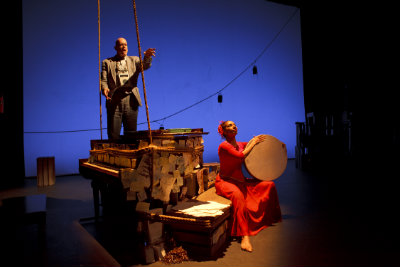And God Created Great Whales

Rinde Eckert and Nora Cole in AND GOD CREATED GREAT WHALES. Photo by Steve Gunther.
BOTTOM LINE: Based on a great American novel, dramatically and musically complex, this celebrated avant-garde play is an amazing journey for those who have the guts to go for it.
This website is called “Theatre is Easy,” but sometimes that’s just not true. Sometimes, theatre can be difficult. Not every artist is interested in appealing to an extensive audience. Writer-composer-performer Rinde Eckert has had a long and celebrated career creating performance pieces that challenge even the most open-minded audiences. In 2000, Eckert won an Obie Award for And God Created Great Whales, which has subsequently been seen around the United States and overseas. He’s continued to write and perform new works, even being shortlisted for the Pulitzer Prize. But there’s something about Great Whales that Eckert, or the theatre world, isn’t finished with. So it’s back at the Culture Project, where it ran back in 2000, and again the following year.
Unfinished business is, in fact, one of the work’s major themes. Eckert plays Nathan, a piano tuner and would-be composer who suffers from a condition that is destroying his memory. Such a fate would surely leave most of us terrified, or inspire us to spend more time with our loved ones, but Nathan is focused on one thing: finishing his first, and last, opera. He’s created an elaborate system of recorded messages (he even wears a tape recorder around his neck) to help him stay focused as his disease progresses, and receives help from an “infallible” imaginary woman dressed in a gown made from what looks like a red stage curtain. These are the only two characters in the play, but there’s plenty going on: this “relationship” represents a man struggling with his creativity, coming to grips with his mortality, and taking comfort in the memory (what’s left of it) of the woman he’s loved, fruitlessly, for years.
The subject of Nathan’s opera is, naturally, Moby Dick, the classic American novel about men of the sea on a doomed quest. So it’s not just that Great Whales depicts a character coping, in his way, with the erosion of his very identity that makes it so tough. Everyone knows (or should know) the basics of the novel’s plot, but those who have actually read it will have an easier time following Nathan’s progress through the opera. Here’s something else: there is a lot of discussion of music that isn’t translated into civilian language for those who aren’t musically educated. The play is almost entirely a representation of what’s in Nathan’s head, and as such isn’t interested in being accessible. Let’s face it: it’s just not designed for a casual audience. But what’s in Nathan’s head, if you can hang in there, is glorious, and Eckert and his costar, Nora Cole, are perfection. They play not only their primary roles, but various characters from Moby Dick, from narrator Ishmael to Captain Ahab to Pip, the cabin boy. With little in the way of a set (though what’s there is beautifully designed), the play depends on these characterizations to bring 19th-century New England and the whaling ship Peqoud to life. They manage all this, by the way, in 80 minutes.
Cole, a veteran of musicals on Broadway and elsewhere, is a fantastic singer and a masterful actress. Eckert is what is known in the opera world as a heldentenor, meaning he has a particularly generous range, which allows him to stray into baritone territory. Even without knowing this terminology, it should be clear to anyone that his voice is extraordinary; he even has command of a strong, clear falsetto that is almost a legitimate soprano. I frequently hear, even from people who are musically inclined, that they don’t care for opera, but how could anyone see, and hear, Eckert’s aria as whaler-turned-clergyman Father Mapple and remain unmoved? Standing atop his piano, which doubles as a pulpit, he preaches, in song, “Are we not called like Jonah? Not to Nineveh to scold the sinners, but to the fearful depths, the bottomless reaches, to the very belly of the whale?” This and many other moments of And God Created Great Whales combine the grandiose power of opera with the intellectual complexities of avant-garde theatre. Have I made it clear this show is not for sissies?
Like Ahab, determined to get Moby Dick no matter how long it takes, Eckert keeps coming back to this project, and it’s not just him: both Cole and director David Schweizer (who deserves praise for giving the piece something many similar works lack—a sense of forward motion) worked on the original production. It’s hard to imagine anyone besides Eckert himself playing Nathan, so intimately is the role tied to his distinctive vision and abilities. Luckily, we need not imagine it, at least not yet. Of course, time is passing, and has passed, since And God Created Great Whales made its debut: the tape recorders that provide Nathan’s lifeline now look even more like antiques than they did originally, and an opera of Moby Dick, nonexistent in 2000, has now actually been written. As if in acknowledgment of these changes, Eckert and his collaborators continue to explore Great Whales as if it were brand new, not merely remounting it but reimagining it. If they are willing to do the work to keep this unique play alive and evolving, there should be an audience—passionate, if not abundant—willing to do the work to experience it. It’s something special.
(And God Created Great Whales plays at 45 Bleecker Street between Lafayette Street and the Bowery, through March 25, 2012. Performances are Tuesdays through Satrudays at 8PM and Sundays at 3PM. Tickets are $55 and are available at cultureproject.org or by calling 866.811.4111.)

